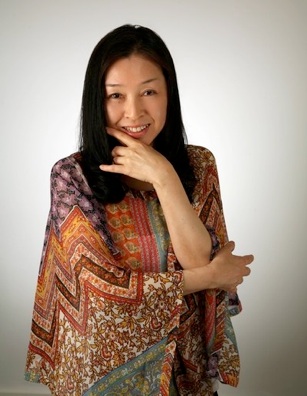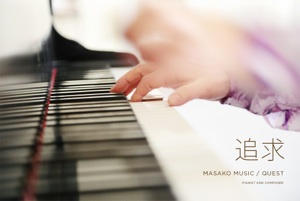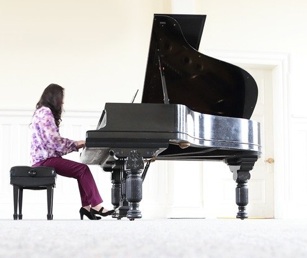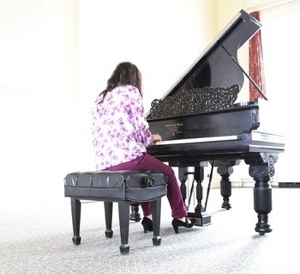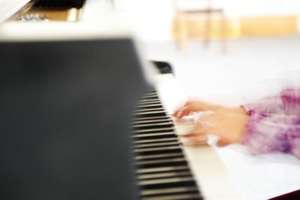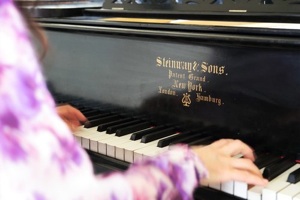As a reviewer, it is always very exciting when music by a new artist comes in for review that stands apart from the “norm.” Masako’s first album, Masako, was just such an album when it arrived a little more than two years ago. Produced by Will Ackerman, the music really spoke to me from an emotional level as well as a musical one. Masako recently released her second album, Call of the Mountains, which debuted on the Zone Music Reporter charts at #1 for January and February of this year. In doing this interview, I have found Masako to be as elegant and graceful as her music - yet very approachable! Enjoy!
KP: Hi Masako! Has it started to thaw on the east coast yet?
M: I was in New York the last couple of days and enjoyed seeing spring flowers there such as narcissus and cherry blossoms. Then I came back to New England last night and it snowed again!
KP: I know a LOT of people are really getting tired of winter back there! On the brighter side, congratulations on your #1 status on the Zone Music Reporter charts for January and February 2014! That is especially impressive since Call of the Mountains was released in early January and debuted at #1. What was the inspiration for that album?
M: Thank you, Kathy. It's really an honor and also a great start for this album. The major inspiration for the album is the mountains that I have come to know since I moved to a town in New England years ago.
KP: You have also been nominated as Best New Artist and your debut album, Masako, is nominated as Best Piano Album by the ZMR awards for 2013. That’s really an awesome start - and the honors are very well-deserved! Does that add pressure on you for the next album?
M: Not really. I always concentrate on what I want and need to do, so I don't feel much pressure.
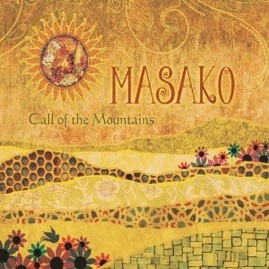
Click the album covers to read Kathy's reviews.
KP: I really love both albums! You have such an amazing piano touch and such a graceful style. I know you have had very intense and extensive training. Tell us about it, if you would.
M: Thanks, Kathy. It's quite an honor to receive such compliment from you. The teacher who has had the biggest influence on me is Ms. Yuko Yamaoka. She was a judge for the International Tchaikovsky Competition in Moscow. Her teaching was very strict and she required her students to be perfect in terms of their skills as well as artistry. And she never compromised.
KP: Do you teach piano along with composing and performing?
M: I'm not teaching right now, but I had many students when I was very young. During my teaching years, I worked for Yamaha Music Foundation.
KP: Will Ackerman produced both of your albums. How did you connect with him?
M: When I moved up to the North East , I already knew Will Ackerman lived somewhere in the northern states, but I was too busy to contact him the first couple of years. At the end of 2010, it seemed the time was right that I made my own album with him.
KP: Do you plan to continue working with Will and recording at Imaginary Road?
M: I want Will to produce my third album as well.
KP: Let’s talk out about your background and early life. Where were you born and where did you grow up?
M: I was born in the town of Shibuya in Tokyo, Japan, and grew up in Tokyo and its vicinity.
KP: Are any other members of your family musicians?
M: My father plays the violin and frequently gives concerts, but many of my family members and relatives seem more interested in dance rather than music. A couple of them are very successful dancers in Japan. I was influenced by them from an early age. Although I'm not a professional dancer, I love dance as much as music.
KP: They are very closely related. Pianists are in a way small-muscle dancers! How old were you when you started playing the piano? When did you start piano lessons, and how long did you take lessons?
M: I started playing the piano at the age of four, when I started taking piano lessons. I took lessons off and on for a total of almost twenty years.
KP: Was your music training mostly classical?
M: Mostly, but in my 20's, I was very interested in jazz. I especially loved Clare Fischer, Ceder Walton and Herbie Hancock, so I studied jazz piano. My teacher was Takehiro Honda who played with Sadao Watanabe, the saxophonist.
KP: No wonder your music has so many influences and is so distinctive! Were you encouraged to improvise or compose by your piano teacher(s) or anyone else?
M: One of my piano teachers was a composer and encouraged me to read chord names. It helped me a lot. Also, I often composed small pieces and let him listen to them and he shared his thoughts on them.
KP: Do you play other instruments?
M: Not at all except for synthesizer. I really wish I could play the guitar as I love the guitar sound.
KP: How old were you when you started improvising?
M: I don't remember. Starting when I was very young, my father often made me accompany his violin with my piano. Sometimes he would give me pieces that were too difficult for me to play, but if I couldn't play them, he would become unhappy. So I had to bluff by improvising the accompaniment part to fit the violin's melody part. Such experiences would certainly help one become an improvisor.
KP: I guess so! That’s kind of a “sink or swim” situation! How old were you when you wrote your first song?
M: Around five-years-old. I used the blank space on the back of my piano sheet music. I drew a musical staff of five lines and wrote three short untitled pieces there. I wanted to experiment with different styles, so one was in a traditional classical style, the second piece was more elaborate, and the last one had a more unusual sound.
KP: Were you a music major in college?
M: No. Fashion design was my major in college although I'm not working as a designer. From an early age, I was interested in certain visual arts fields, such as dance and fashion design.
KP: I was actually an art major in college, too. Have you ever worked in fashion design?
M: I'm excited to hear that you were an art major! I'm curious how you have become involved in music so much. I think I need to interview you next time!
Many years ago one of my designs was chosen and appeared in a fashion show sponsored by a TV station. But I've been working as a professional musician from my late teens and I've never really worked as a fashion designer.
KP: When did you come to the US? What made you want to come here?
M: My family and I came to the US in 1989 because of my husband's business. When I was in Japan, I never thought I'd come here and live on both the East Coast and the West Coast.
KP: How is music training in Japan different from the US?
M: Back when I was little, most music teachers in Japan were very strict. I don't know how the teachers are now, so I can't compare.
KP: Do you perform very often?
M: I perform and play classical music very often. I think I have to give more New Age solo piano concerts, though.
KP: You are certainly welcome to come and play a house concert here on the Oregon Coast! Any time!
Your playing is very versatile. Have you always had an eclectic taste in music?
M: Yes.
KP: Do you have sheet music for any of your pieces?
M: Just one, "Remembrance, Part 1." I'm not very eager to sell my sheet music.
KP: Why is that?
M: If I have more time, I may be able to create more.
KP: Who or what are some of your biggest musical influences?
M: In this genre of music, I was influenced by Will Ackerman. I really feel spirit from each note he plays. His sound itself always has meaning.
KP: What inspired you to start composing your own music?
M: As I said earlier, when I was very young, what often motivated me to compose was to experiment with pieces. More recently, it is more of what appeals to my senses, my experiences and musical knowledge that all work together to inspire me to compose. New England is rich in nature. I think being surrounded by nature helps you clear your mind of distracting thoughts and become creative.
KP: I really agree with that! Have you done any composing for films and/or TV?
M: No.
KP: Have you done much session work as a musician?
M: I did a lot of session work in Japan. It was fun!
KP: What has been your most exciting musical moment or experience so far?
M: When I strike an idea for a composition, it's always very exciting.
KP: Is there a particular philosophy that you try to convey in your music?
M: Not particularly.
KP: Who are your favorite composers?
M: As for piano players, Arturo Benedetti Michelangeli. Recently, I often listen to Valentina Lisitsa - her sound is really lovely!
KP: If you could have any three wishes, what would they be?
M: More time, more strength and more energy!
KP: What’s up next for you?
M: I'd like to always remind myself of this. To do things that interest me as intently and as much as possible.
Many thanks to Masako for taking the time to chat with us. To learn more about Masako and her music, be sure to visit
her website and her
Artist Page here on MainlyPiano.com.
Kathy Parsons
April 2014

